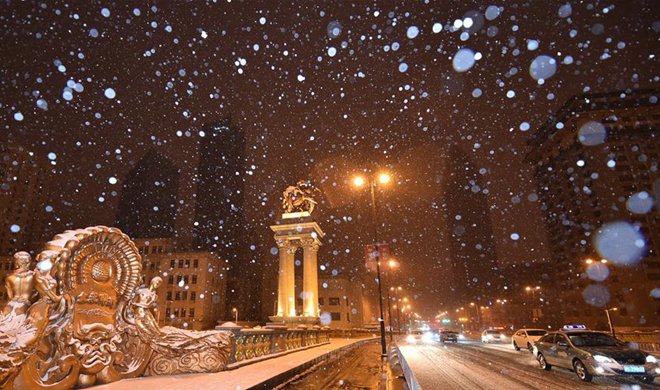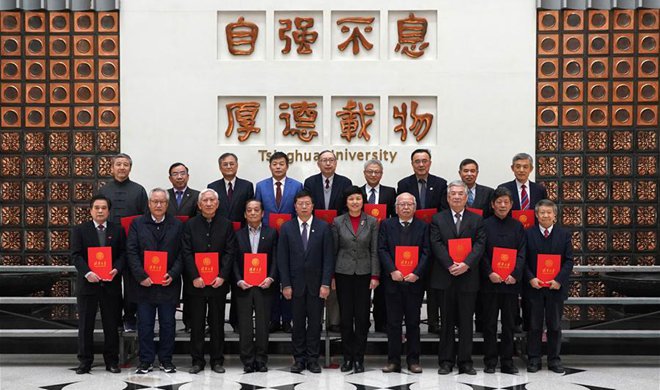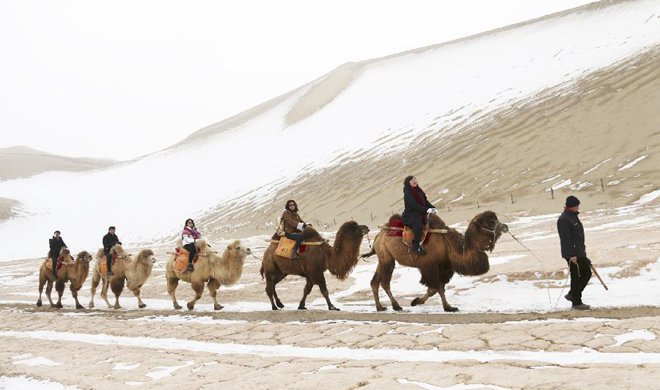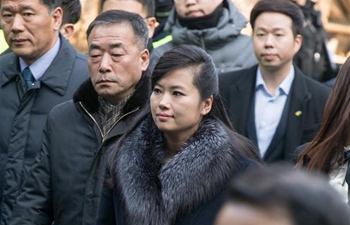by Tao Jun, Nguyen Xuan, Bui Long
HANOI, Jan. 22 (Xinhua) -- In a traditional long robe with a large belt, the muscular man from China's Inner Mongolia looked like a wrestler, and then his resounding voice rendered the Vietnamese audience packed at the auditorium speechless.
The man with a crew-cut hairstyle performed throat singing, an intangible cultural heritage of humanity, at a stunning art program performed by Chinese and Vietnamese singers and dancers on Saturday at the Vietnam-China Friendship Palace in Hanoi, which was built with Chinese aid and opened its doors in 2017.
Throat singing was inscribed in 2009 on the Representative List of the Intangible Cultural Heritage of Humanity of the United Nations Educational Scientific and Cultural Organization (UNESCO), under the name of the Mongolian art of singing, Khoomei.
Khoomei is a style of singing in which a single performer produces a diversified harmony of multiple vocal elements, including a continued bass element produced in the throat. The form is reserved for special events and group activities such as horse races, archery and wrestling tournaments, large banquets and sacrificial rituals.
"I was deeply impressed by his Khoomei performance, which was very special and unique. This is my first time listening to such a special art of singing," Hoang Ngoc Nguyen Hong, lecturer at the People's Police Academy in Hanoi, told Xinhua after the art program.
The graceful lecturer, holder of a doctoral degree, was wearing a purple "ao dai" (Vietnam's traditional long dress). She remarked that the art program was unique. "I felt like I was flying up from a vast prairie when I listened to their (Inner Mongolia) music and saw their dance performances," she said, blossoming into a warm smile.
Another Vietnamese audience member was also bewitched by Khoomei. "I love the throat singing performance most. This is the first time I have enjoyed such a special performance. I could not believe that humans can make music like that with their throats," Vu Hai Nam, a freshman at the National Academy of Public Administration, told Xinhua.
The first-year student from the northern Quang Ninh province, which borders China, said he was also impressed by the Chinese dances which "were graceful and gentle one minute and then wild and intense the next."
"When watching the dance named 'Horsehead Fiddle', I could feel the horses' strength and freedom in a vast prairie," said the young man timidly.
Horsehead fiddle, or Morin Khuur, is a traditional bowed stringed instrument, and identified by UNESCO as one of the Masterpieces of the Oral and Intangible Heritage of Humanity.
Not only singers and dancers from Inner Mongolia brought down the house during each performance, but Vietnamese artists also made the audience erupt into applause.
Do To Hoa, dubbed "The Nightingale" by her fans, sang songs in both Vietnamese and Chinese, showing off her soprano singing voice and good command of the Chinese language.
"It is my honor to perform today to celebrate the 68th anniversary of establishing diplomatic relations between Vietnam and China. I have already graduated in Vietnam with a major in classical music," the young woman in a white dress told Xinhua.
"I am studying in Beijing for a master's degree in folk music, and I will seek a doctoral degree in music in China," she explained, while standing on the stage right after the show.
Hoa expressed her hope that the Chinese embassy in Vietnam and relevant agencies will organize cultural programs more frequently in the two countries, as the exchanges of music, dance and martial arts help enrich people's knowledge and bring them closer together.
Other Vietnamese people expressed similar hopes. "I hope Vietnam and China will have more exchange programs in many fields such as culture, art, education and trade. So that we can forever be each other's good friends and good neighbors," said Hong, who got her master's degree in China, and doctoral degree in Vietnam.
Another local audience member, Ha Van Thinh, an official from Hanoi's rural Dong Anh district, said he wanted more Chinese television and feature films to be screened in Vietnam, and Chinese actors and actresses such as Donnie Yen and Jet Li to visit the country more often.
"As with the other audience members, I was also super excited when we heard some of the first notes of the theme song from the famous 'Journey to the West' series. Generations of Vietnamese grew up watching this series. The song reminds us of our childhood," the man said with his broad smile on his face.















